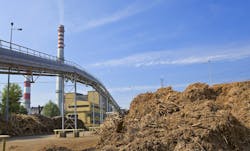Solvay Fires Up 2nd Biomass Boiler at German Soda Ash-Bicarbonate plant
Chemical products manufacturer Solvay has inaugurated a second biomass boiler at its Rheinberg soda ash and bicarbonate plant in Germany.
Currently, the plant is fully powered by waste wood, phasing out the use of thermal coal for energy use at the site and reducing 480 kilotons of CO₂ annually as compared to 2021.
The two biomass boilers at the Rheinberg facility use waste wood, which otherwise goes unrecycled, from industrial and demolition residues to generate steam and electricity, completely replacing the use of fossil fuel. The shift will reduce the plant's CO2 emissions by 65 percent annually compared to 2021 levels.
“Ending coal use at Rheinberg is a major step in Solvay's global energy transition,” said Philippe Kehren, Solvay CEO, in a statement. "Through 90 energy transition and energy efficiency projects worldwide, we are committed to reducing our carbon footprint and achieving carbon neutrality by 2050. Rheinberg’s transformation supports both our competitiveness and our long-term sustainable growth ambitions.”
The system uses cogeneration technology to help reach over 90 percent efficiency by producing both steam and electricity. The announcement is expected to contribute to a 5 percent reduction of Solvay’s overall GHG emissions by 2025.
A regenerative thermal oxidation (RTO) process was also introduced at Solvay’s Green River, Wyoming plant, which is set to contribute to another 4 percent reduction in group-wide GHG emissions by 2025.
Many Possible Future Paths to Net Zero
Including Sodium Ion, Volvanic Geothermal and Nuclear Fusion
Read EnergyTech's free Innovation and Experimentation E-Book
